
How To Use Cannabis To Improve Sleep
Le cannabis est utilisé à bien des escients, y compris la promotion d'un sommeil sain. Mais bénéficie-t-il réellement au sommeil ? Est-il plutôt nocif ? Quels composés précis du cannabis sont susceptibles d'aider ? Quelles variétés en particulier ? Trouvez les réponses à toutes ces questions (et plus encore) dans cet article.
In many people, cannabis produces strong feelings of relaxation that can help to promote sleep. Hence, it's no wonder that so many people use and/or recommend using cannabis before bed in order to enjoy a better night's rest. But how exactly does weed affect the way we sleep, and is it always a good idea to light up before bed? Well, the answer seems to be far from straightforward. Keep reading for an in-depth look at cannabis and its effect on sleep.
The importance of a good night's sleep
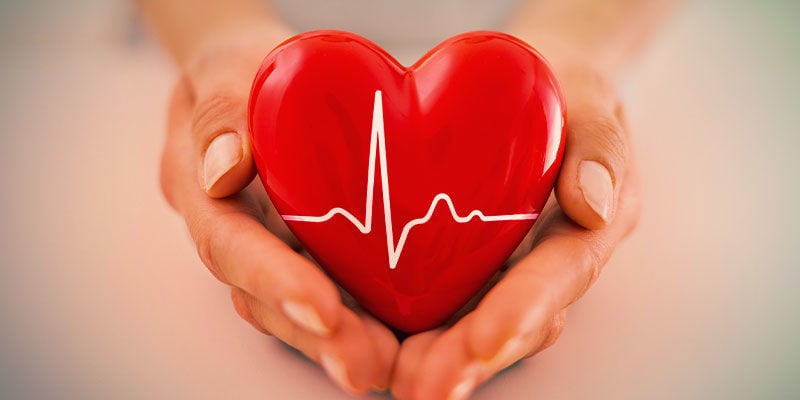
Consistently getting a good night's sleep is crucial for our well-being. Missing out on sleep or getting poor-quality rest can negatively impact various bodily functions, including:
- Brain function and productivity
Sleep is directly linked to our learning ability and productivity. Research shows, for example, that sleeping impacts our ability to learn new skills, recall information, and form memories. At the same time, sleep has also been shown to impact our ability to solve problems (Babson & Bonn-Miller, 2014).
- Emotional and mental health
A lack of sleep can not only impact cognitive function; it can also affect our ability to clearly see, interpret, and react to the world around us. Research shows that a lack of sleep impacts our ability to regulate stress and mediate our emotions. In some ways, sleep can be thought of as a chance to reboot or recharge not only the body, but also the mind, allowing it to function at its best. Meanwhile, not getting enough sleep can put us at risk of developing mental health disorders (Capello, 2020).
- Weight and metabolism
Poor sleep has also been shown to directly impact metabolism and weight. Sleeping less than the required amount (which is roughly 7–9 hours for most people) causes a spike in cortisol, triggering a stress response in our body in which it stores energy for when we're awake. At the same time, regular sleep deprivation can also interrupt our body's processing of insulin, affecting its ability to turn sugar and fat into energy (Columbia University Department of Psychiatry, 2022). Lack of sleep has also been shown to affect appetite and satiety after eating, as well as, of course, our energy level, which can in turn impact our ability to stay active and exercise (Paturel, 2020).
- Heart health
Last but not least, another part of the body that's heavily affected by poor sleep is the heart. Studies show that poor sleep directly impacts blood pressure, and has even been linked to type 2 diabetes (Newsom, 2022).
How does cannabis affect sleep?

Cannabis is a complex substance that can affect many bodily functions, including sleep. In fact, around 50–60% of cannabis users report using it for sleep improvement, and 85% of medical cannabis patients with chronic pain say cannabis helps them to sleep better. If you've ever tried cannabis (regardless of how much or how often), you might have noticed it impacting:
- Your ability to fall asleep
- How much you dream
- How rested you feel in the morning
While there is still a lot we do not know about cannabis and its effects on the body, research has shown that it clearly can impact sleep in a number of ways.
Right off the bat, numerous studies have demonstrated that consuming cannabis before bed may promote sleep readiness and reduce the chance of experiencing sleep disturbances. This appears especially true for people who have difficulties getting to sleep or people dealing with chronic pain (Centers for Disease Control and Prevention, 2021).
This could be due to the fact that, through their interaction with the endocannabinoid system, cannabinoids like THC and CBD might respectively increase levels of adenosine—a sleep-promoting chemical—and inhibit our arousal, or alertness (Russo, Guy, & Robson, 2007).
However, sometimes THC, especially when taken in high doses or by people who aren't accustomed to its effects, can actually make it harder to fall asleep (Murillo-Rodriguez et al, 2003).
How cannabis affects the sleep cycle
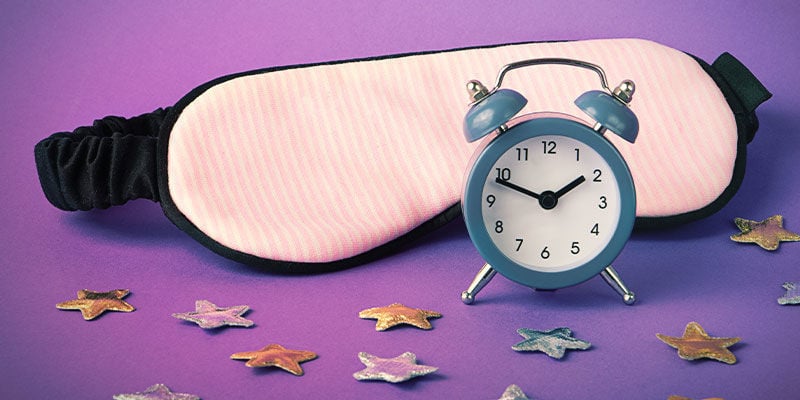
The human sleep cycle is divided into two categories: REM (rapid eye movement) and NREM (non-rapid eye movement) sleep. These categories comprise a total of four different stages of sleep:
-
Stage 1 (NREM): This is a stage of light sleep that lasts roughly 5–10 minutes and marks the transition from wakefulness to the sleeping state. During this stage, your muscles relax (you might catch them twitching) and your breathing, heartbeat, and eye movements all slow down. Brain activity will also start to slow down, but remains fairly active compared to later stages.
-
Stage 2 (NREM): The second stage of sleep is still considered "light sleep". According to the American Sleep Foundation, people spend roughly half of their total sleep time in this stage (Tassinari et al, 1999), during which the brain starts to produce special brain waves called "sleep spindles", which are thought to be a sign of memory processing. During stage 2 of the sleep cycle, your body temperature drops, your breathing and heart rate start to stabilise, and your eye movements cease.
-
Stage 3 (NREM): Also known as delta sleep, deep sleep, or slow wave sleep, stage 3 of the sleep cycle marks the beginning of deeper rest. During this stage, you might not be woken by noises or other distractions in the environment. Delta sleep is also when your body undergoes most of its physical repairs, and getting enough deep sleep is what leaves you feeling refreshed in the morning. During this stage, your brain also stores "declarative memories", such as facts or skills you've learned, as well as personal experiences.
-
Stage 4 (REM): REM sleep is characterised as the only "active" stage of the sleep cycle. Brain activity during REM sleep closely resembles what we experience when we're awake, though our bodies are completely immobilised. It is also the stage during which we dream, and when emotional memory processing is thought to take place.
During a full night of sleep, our bodies pass through this entire cycle roughly 4–5 times. Also, we do not progress through these cycles in order, and the amount of time we spend in each stage of the cycle will vary throughout the night.
Cannabis seems to affect the aforementioned sleep cycle in a number of ways. First and foremost, the soothing and sleep-promoting properties of cannabis might reduce sleep latency, making it easier for you to enter stage 1 of the cycle. Moreover, research suggests that cannabis could reduce the amount of time spent in REM sleep, subsequently reducing dreaming, and increase the amount of time in stage 3 delta sleep (Suni, 2022). Note, however, that these results aren't always consistent among the limited number of cannabis sleep studies.
How cannabis affects sleep disorders
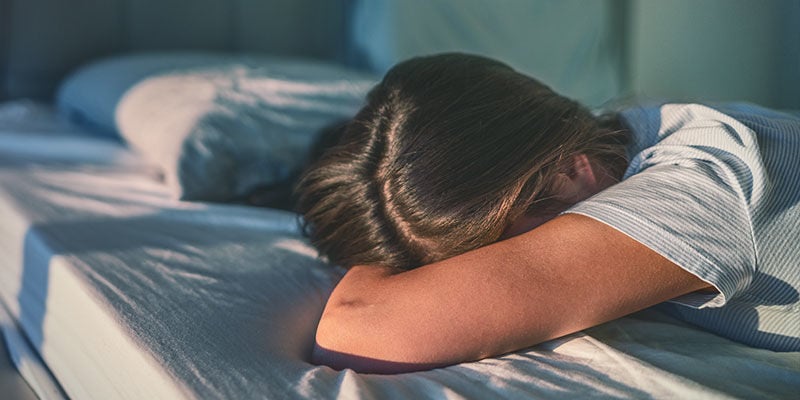
Sleep disorders are very common. Cleveland Clinic, for example, reports that roughly 70 million Americans suffer from sleep disorders like insomnia, sleep apnoea, restless leg syndrome, and narcolepsy (Cleveland Clinic, 2020). Given the growing legality of cannabis, many people suffering from these disorders are looking to weed for relief. How effective cannabis is at relieving sleep disturbances, however, isn't clear.
Studies show that cannabis may make it easier to fall and stay asleep (Gates et al, 2014), though the actual implications of this are unclear. As mentioned earlier, cannabis may also increase the time we spend in stage 3 delta sleep while simultaneously reducing the amount of time spent in REM. Whether this is positive or not, however, isn't so straightforward. It may prove beneficial, for example, for people suffering from nightmares. However, it is also important to consider the implications of REM sleep deprivation. While REM sleep is less important for adults, it is believed to play a crucial role in brain development in infants, children, and young adults. Moreover, REM sleep is also important for emotional and memory processing (Walsh J et al, 2021).
Last but not least, it's also important to note that cannabis use can sometimes contribute to sleep disturbances. One of the most common side effects of cannabis withdrawal, for example, is disrupted sleep. Some of the most common sleep disturbances resulting from cannabis withdrawal include sleep latency (i.e. difficulty falling asleep) and disturbed sleep (waking up in the night, sometimes as a result of returning to more vivid dreaming). This can be problematic for regular recreational cannabis users as well as medical cannabis patients going through periods of abstinence, and can actually contribute to increased cannabis use and dependency (Summer, 2022).
Which cannabis strains are best for sleep?
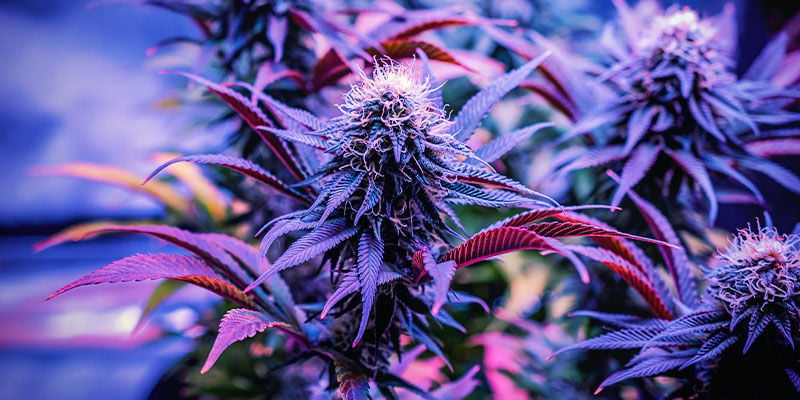
Cannabis contains over 500 chemical constituents in different concentrations. Combine that with the fact that everyone reacts to cannabis differently, and it’s easy to see why it can be so difficult to find the right cannabis strain for any given purpose.
When picking a cannabis strain for sleep, it's primarily important to consider specific cannabinoids and terpenes.
Cannabinoids
Cannabinoids are unique compounds produced by plants and animals, including humans, that interact with our innate endocannabinoid system. These cannabis-derived chemicals tend to have the greatest effect on our physiological processes, including sleep.
THC
THC is often the most abundant cannabinoid in modern cannabis strains. When it comes to sleep, THC can produce sleep-promoting effects that might help you fall asleep faster and possibly contribute to spending more time in stage 3 sleep. However, high concentrations of THC might make it harder to fall asleep and can cause paranoia and anxiety in some people, especially those unfamiliar with or very sensitive to the effects of THC.
CBD
CBD is generally the second-most abundant cannabinoid in modern cannabis strains. It is non-intoxicating, meaning it won't get you high, and its mechanism of action still isn't fully understood. The effects of CBD tend to be subtly relaxing and are often invoked to relieve tension, which may make it easier to fall asleep. At the same time, CBD has been observed as wake-promoting in some studies (Babson & Bonn-Miller, 2014).
CBN
CBN is a lesser-known cannabinoid often found in high concentrations in aged cannabis plant material. Its full profile of effects is unclear, though many sleep products include this cannabinoid in relative abundance, claiming it may help to promote sleep.
Terpenes
Terpenes are aromatic molecules produced in the same glands as cannabinoids. They give the marijuana plant its unique aromas, and also impact the physiological effects we experience, to a degree. The following terpenes are thought to potentially affect sleep quality.
Myrcene
Myrcene is one of the most common terpenes found in cannabis. It is also commonly found in beer—where it contributes a hoppy, spicy aroma—and in mangoes. It is believed to promote relaxing effects, both physical and mental, which may help if you're looking for a cannabis strain to promote sleep.
Linalool
Linalool is another key cannabis terpene, contributing spicy and floral aromas. It is also found in abundance in lavender, which has long been used for its soothing and sleep-promoting properties.
Caryophyllene
Caryophyllene is a spicy terpene found in black pepper, other spices, and, of course, cannabis. This terpene is unique in that it is capable of interfacing directly with endocannabinoid system receptors, and may affect processes related to sleep, pain, and inflammation.
How to use cannabis for sleep
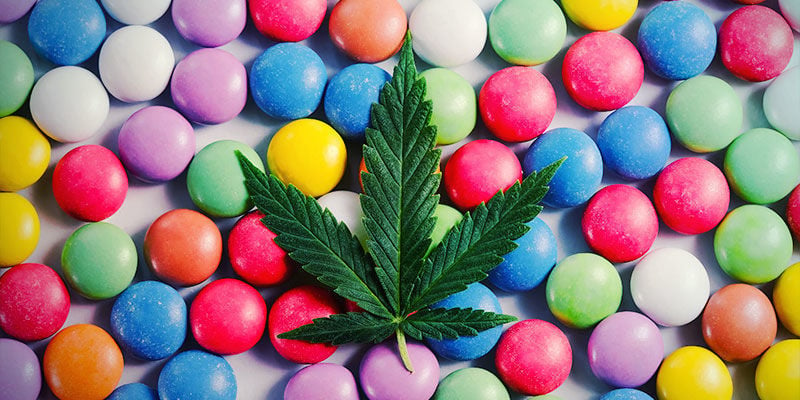
Finding the right strain is super important when looking to use cannabis for a specific purpose. But how and when you use it is just as important. Below you'll find some general tips to effectively use cannabis to promote a better night's sleep.
Dosing
Dosing is always important when enjoying cannabis. To promote sleep, we recommend starting with a small dose and gently increasing it if needed. This will help to prevent the negative side effects of cannabis (particularly high-THC strains), which can include anxiety, paranoia, or even nausea.
Timing
If looking to achieve a healthy night's sleep, try using cannabis in the evening, before you tuck in. If you smoke or vape, consider lighting up 30–60 minutes prior to hitting the hay. If you're using edibles, on the other hand, take them 60–120 minutes before bed to give them enough time to take action.
Consumption method
How you consume cannabis is a very personal preference. To get better sleep, we recommend you use whatever method you're most comfortable and familiar with. Smoking and vaping are convenient in that you can dose “as you go”, with less of a chance of experiencing overwhelming effects. Edibles and other oral intake methods, however, are more profound in their effects, taking longer to come on and lasting longer as well. Whether this is beneficial or not is up to the individual.
Top 5 weed strains for sleep
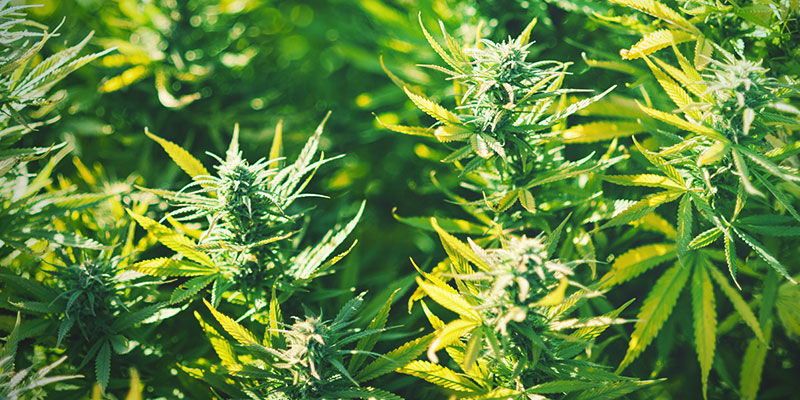
Based on everything we've covered so far, here are some strains to try if you're looking to use cannabis for a better night's sleep.
Gorilla Glue (Zamnesia Seeds)
Our Gorilla Glue is heavily inspired by the original GG #4. This indica-dominant strain contains roughly 24–26% THC alongside an exotic mix of terpenes, which combine to produce a strong body stone and mental euphoria that's great for unwinding after a long day. Just remember to enjoy Gorilla Glue in moderation given her high potency!
Purplematic CBD (Royal Queen Seeds)
Purplematic CBD is an autoflowering CBD-rich strain from Royal Queen Seeds. Her dense, purple flowers contain roughly 17% CBD, 0.5% THC, and rich terpenes that give her a fruity, sweet, and earthy aroma. Her effects aren't intoxicating, but instead leave you feeling relaxed and at ease. Enjoy her in the evening to reduce tension as you prepare for a cosy, restorative night's sleep.
Kalini Asia (Zamnesia Seeds)
Kalini Asia is a unique Kush variety. Her eye-catching purple flowers boast a delicious Kush aroma that combines pine, citrus, and spicy notes, and pack up to 24% THC. The effects are very physical, characterised by a warm, tingling body stone that'll leave you glued to the couch for hours. Enjoy her an hour or so before bed, and you'll likely fall asleep before your head hits the pillow!
Great White Shark (Green House Seeds)
Great White Shark belongs to Green House Seeds' iconic "White" family—a selection of strains renowned for producing such a thick coating of trichomes that they look almost completely white! Great White Shark produces roughly 14% THC (ideal for beginner smokers or those sensitive to THC's intoxicating effects), 1.7% CBD, and up to 0.8% CBN. Her effects are very relaxing and well-balanced, making her an ideal choice for those seeking a natural nightcap!
Girl Scout Cookies (Zamnesia Seeds)
Girl Scout Cookies is loved across the US for its well-balanced effects and delicious cookie smell. Our version of this classic boasts a rich, dessert-like aroma and up to 22% THC, resulting in a strong mental euphoria that'll lift your mood before relaxing your entire body. Enjoy her 1–2 hours before bed as you take in a movie or meal to give her physical effects time to kick in.
The risks of using cannabis for sleep
Cannabis is often touted as a great natural sleep aid—and that might be true for some people. However, as we saw in this article, cannabis can also negatively impact your ability to fall or stay asleep. If possible, speak to your doctor about your sleep issues and your desire to use cannabis, for case-specific advice. In general, always use cannabis in moderation, and cease use if you experience negative effects on your sleep habits.
Cannabis for sleep: friend or foe?
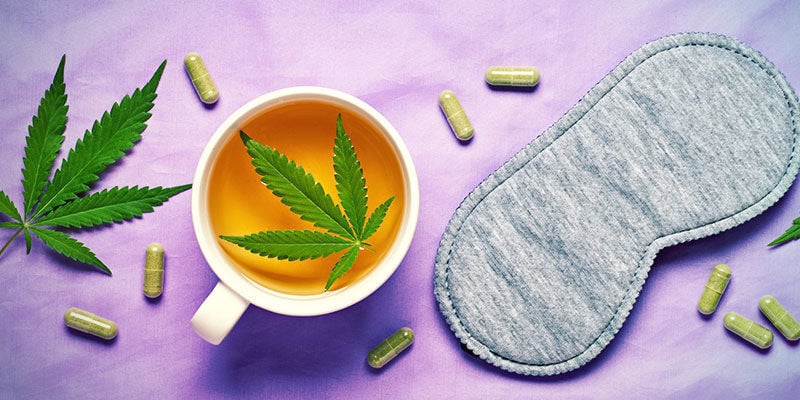
There is no definitive answer to whether or not cannabis can improve sleep. Unfortunately, we still don't know enough about the plant's complex chemical makeup, and everyone seems to experience its effects differently. If you're interested in trying cannabis to promote sleep, do so with care. And don't forget that there's a wide variety of other sleep-promoting herbs out there.
- Babson, Kimberly A., Bonn-Miller, & Marcel O. (2014, June). Sleep Disturbances: Implications for Cannabis Use, Cannabis Use Cessation, and Cannabis Use Treatment - https://link.springer.com
- Capello, & K. (2020, December 21). The Impact of Sleep on Learning and Memory. University of Pennsylvania School of Medicine, Chronobiology and Sleep Institute. - https://www.med.upenn.edu
- Centers for Disease Control and Prevention. (2021). About Sleep and Your Heart Health - https://www.cdc.gov
- Cleveland Clinic. (2020). Common Sleep Disorders: Symptoms, Causes & Treatment - https://my.clevelandclinic.org
- Columbia University Department of Psychiatry. (2022). How Sleep Deprivation Impacts Mental Health. - https://www.columbiapsychiatry.org
- Gates PJ, Albertella L, & Copeland J. (2014 Dec). The effects of cannabinoid administration on sleep: a systematic review of human studies. Sleep Medicine Review, Volume 18. - https://pubmed.ncbi.nlm.nih.gov
- Murillo-Rodriguez, Eric, Blanco-Centurion, Carlos, Sanchez, Cristina, Daniele, Piomelli, Shiromani, & Priyattam J. (2003/12/01). Anandamide enhances extracellular levels of adenosine and induces sleep: an in vivo microdialysis study, Sleep Volume 26(8), 943-947. - https://academic.oup.com
- Newsom, & R. (2022, April 15). Weight Loss and Sleep. Sleep Foundation. - https://www.sleepfoundation.org
- Paturel, & A. (2020, July 18). Does Sleep Affect Weight Loss? - https://www.webmd.com
- Russo, E., Guy, G., & Robson, P. (2007). Cannabis, Pain, and Sleep: Lessons from Therapeutic Clinical Trials of Sativex®, a Cannabis-Based Medicine. Chemistry and Biodiversity, Volume 4(8), 1729-1743. - https://onlinelibrary.wiley.com
- Summer, & J. (2022, April 26). What is REM Sleep and How Much Do You Need? - https://www.sleepfoundation.org
- Suni, & E. (2022, July 8). Stages of Sleep: What Happens in a Sleep Cycle | Sleep Foundation - https://www.sleepfoundation.org
- Tassinari, C. A., Ambrosetto, G., Peraita-Adrado, M. R., Gastaut, & H. (1999). The Neuropsychiatric Syndrome of Δ9-Tetrahydrocannabinol and Cannabis Intoxication in Naive Subjects - https://link.springer.com
- Walsh JH, Maddison KJ, Rankin T, Murray K, McArdle N, Ree MJ, Hillman DR, & Eastwood PR. (11/12/2021). Treating insomnia symptoms with medicinal cannabis: a randomized, crossover trial of the efficacy of a cannabinoid medicine compared with placebo. Sleep, Volume 44(11). - https://pubmed.ncbi.nlm.nih.gov
-
 4 min
11 January 2021
How To Relieve Tension With Cannabis
We all know that cannabis can help take a load off at the end of the day, and relieve tension. But what is the science behind this much sought after effect?
4 min
11 January 2021
How To Relieve Tension With Cannabis
We all know that cannabis can help take a load off at the end of the day, and relieve tension. But what is the science behind this much sought after effect?
-
 1 min
6 November 2017
Best Incense For Relaxation And Sleep
Here at Zamnesia, we bring you all sorts of herbs. Herbal incense is a safe and cost-effective way to unwind. Discover our best varieties of incense for easing the mind, body and soul.
1 min
6 November 2017
Best Incense For Relaxation And Sleep
Here at Zamnesia, we bring you all sorts of herbs. Herbal incense is a safe and cost-effective way to unwind. Discover our best varieties of incense for easing the mind, body and soul.













 United States
United States










